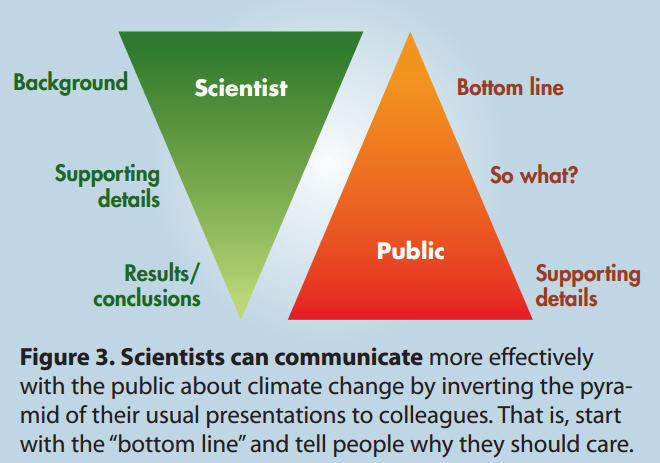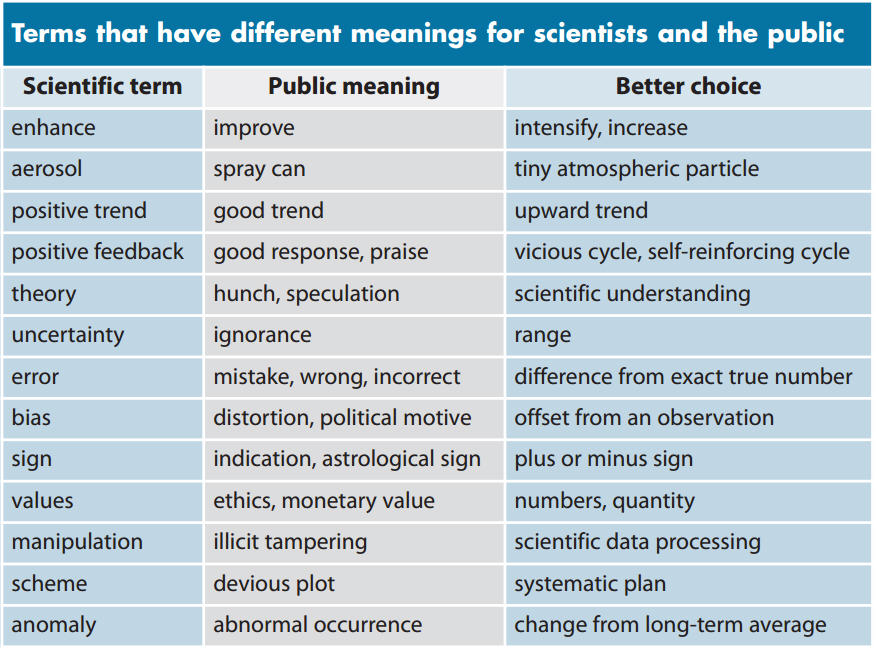I've written about this before. In the Communicating Astronomy With The Public magazine I outlined the Pitfalls and Perils of Science Communication. The absolutely worst thing you can do is engage in deficit thinking - the pretense that you are some Zen Buddhist and a person without your degree is an empty disciple and if you fill them with your knowledge, they will be enlightened.
The second worst thing you can do is underestimate the intelligence of the public because they lack a PhD.
Somerville and Hassol are the brains behind the Climate Communication outreach group, so a few years ago, when they were talking about science outreach in Physics Today ( DOI:10.1063/PT.3.1296), they were talking about how to get more people on the global warming bandwagon, but it applies across science.(1)
Once you lop off the miscreants on the fringes - you are not going to change hardcore anti-pesticide people, anti-GMO people, anti-vaccine and anti-nuclear people on the left nor are you going to change climate deniers or anti-evolution people on the right - who intentionally want to obfuscate science issues for their own reasons, there is a big chunk of the public that is being exploited by misuse of the language of science.
Fear and doubt merchants know this. If someone wants to promote their diet book or their GMOs causes brain damage claims, they will talk about any possible 'association' as a "peer-reviewed study". On the other hand, climate critics will put scare quotes around "suggests" in a study and go on a tirade about what dumb scientists don't know.
The solution? Somerville and Hassol have two I am going to highlight, and then encourage you to read their article.
The first is to 'invert the pyramid' that scientists have been trained to use when discussing research. Scientists are often dealing with fellow experts so they discuss the background and the data landscape, then they detail all of the new findings, and then make a conclusion. Much of the public will benefit more from the bottom line being addressed first.

Credit: Climatecommunication.org
The second is to, unfortunately, be a little more colloquial. We live in a world where car commercials claim their product has 'evolved' and every social psychologist invents a new 'theory' in mainstream journalism once a week, so colloquial terms have actually led to less science understanding, but they have their place.
Take a look at their chart:

Credit: Climatecommunication.org
You know this is true. When it comes to climate science, we know we are warmer than in 1950 but when tree rings did not show it, statistical manipulation to use temperature data became a 'hide the decline' conspiracy theory (see? I used theory incorrectly). When you see partisan science journalists talk about 'confirmation bias' they are talking about political motivation, not a scientifically agnostic offset.
Some don't agree with clear communication and want words to retain meanings - and that is valid, in a science setting, but we should just use Latin in science conferences if we never want words to become colloquialisms. Realistically, no one is abandoning 'theory' and 'evolution' just because they are used by cranks and detractors. In a public setting, when communication and understanding is the goal, just be smarter about word choice.
It's a bad idea to underestimate intelligence of the audience, as I said in the beginning, but it is a very good idea to underestimate their science vocabulary.
Do you agree? Let me know in the comments.
Citation: Richard C. J. Somerville and Susan Joy Hassol, 'Communicating the science of climate change', Physics Today 64, 10, 48 (2011) DOI: http://dx.doi.org/10.1063/PT.3.1296. Link to read: ClimateCommunication.org
H/T/ Austin Frakt
NOTES:
(1) Which is to say mean old Republicans, at least in the world of cartoon caricatures painted by some in science media and in climate science. In reality, many climate skeptics actually know climate science better than believers, the same way a whole lot of atheists can quote the Bible better than religious people - in both cases, it is just that what they do with it may be wrong.
But when it comes to caring about the environment, both sides are not all that far apart. Who recycles more and conserves more energy, Global Warming Denying Republicans or Environmentally Awesome Democrats? They're the same. That common ground means there is hope for science, if we stop letting activists and junk culture merchants politicize science.




Comments